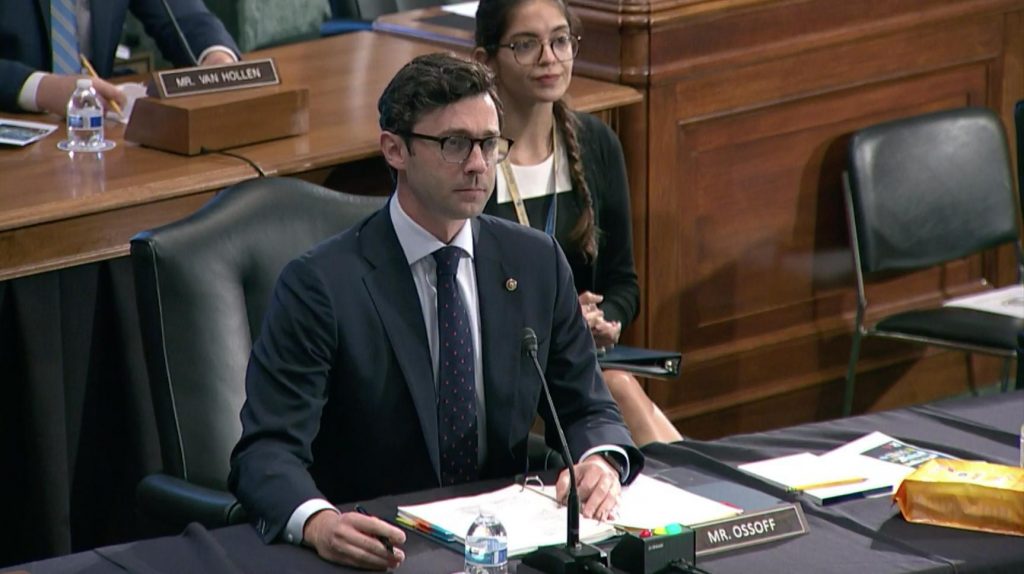Washington, D.C. –– U.S. Senator Jon Ossoff is working to ensure upcoming infrastructure legislation helps Coastal Georgians prepare for the more severe tropical storms, storm surge, and coastal flooding that are predicted by the U.S. military and the nation’s leading meteorological agencies.
In a Senate Banking Committee hearing today, Sen. Ossoff urged Senate colleagues to ensure the infrastructure bill includes help for Georgia’s coastal areas and barrier islands to prepare homes, businesses, and critical infrastructure for the more frequent and severe coastal flooding and hurricanes predicted by U.S. military and meteorological experts.
Sen. Ossoff also emphasized the urgency of increasing Georgia’s coastal resilience from a national security perspective, citing the threats of increased flooding and storm surge at Georgia’s Naval Submarine Base Kings Bay.
The Department of Defense has warned, for example, that Georgia’s Naval Submarine Base Kings Bay is at risk of damage and inundation, while meteorologists at the National Oceanic and Atmospheric Administration predict coastal areas will see more severe weather and more frequent and severe flooding.
“Considering these potential impacts on Savannah, Georgia, on our Naval facility at Kings Bay, on our Barrier Island chain – Cumberland Island, Sapelo Island, Tybee Island – it is vital in my view, and I know I’ve discussed this with the Chairman as well, that this upcoming infrastructure bill include significant investments in coastal resilience to help communities in Coastal Georgia and coastal communities across the country prepare for increased flooding, worse tropical storms, increased storm surge events,” Sen. Ossoff said in the hearing.
When asked about the effects of these weather events on underserved communities in Coastal Georgia, Dr. Rachel Cleetus, Policy Director for the Union of Concerned Scientists, highlighted the need for direct community engagement and flooding assistance in St. Simons Island, Tybee Island, Brunswick, and others.
WATCH: Sen. Ossoff calls for investments in coastal resilience:

Please find a transcript of the exchange below:
SEN. OSSOFF: “Considering these potential impacts on Savannah, Georgia, on our Naval facility at Kings Bay, on our Barrier Island chain – Cumberland Island, Sapelo Island, Tybee Island – it is vital in my view, and I know I’ve discussed this with the Chairman as well, that this upcoming infrastructure bill include significant investments in coastal resilience to help communities in Coastal Georgia and coastal communities across the country prepare for increased flooding, worse tropical storms, increased storm surge events. Can you speak to the kind of infrastructure that will help communities like Savannah, Georgia, adapt to what’s coming?”
DR. ABDOLLAH SHAFIEEZADEH: “So, that’s a great question. We have a whole host of solutions at least from the engineering and science community, and then I would suggest that for every specific location, we need to do a deep study on the hazards that these areas are facing and what sort of solutions need to be taken now. And one point here also I would like to make is that the risks we are facing are dynamic, not static. So we need to have strategies that are adaptive in time, meaning that some of the actions we need to take now. But some of –– we need to also have planned for sustained funding so that as we hear more about them from the earth science community and climatologists, about the trends of the future climate, we are able to make decisions on the goal, and improve the state of infrastructure further. The type of solutions that might be available now for coastal communities, it can range from nature-based systems to flood walls and levees to improving the stormwater collection systems to elevating homes or buying out some of the houses in the floodplains. And the good news is that the benefit to cost ratio for many of these measures are very high, and it’s highly justified to take those actions.”
SEN. OSSOFF: “Thank you Dr. Shafieezadeh, and with the Chairman’s permission, just one final question for you, Dr Cleetus, please. The impacts of climate change and these events will not be uniformly distributed. Low income communities, vulnerable communities, communities in the floodplain, communities who already live in under-resourced neighborhoods, dilapidated housing will be more severely impacted. I’m thinking, for example of the Geechee communities along Georgia’s coastline, descendants of West African slaves brought to Georgia and other parts of the southeast, to work in coastal plantations who still endure a high level of poverty. These communities are going to be hit the hardest, what can we do to ensure that our investments in coastal resilience help and protect those who are most vulnerable, Dr. Cleetus?”
DR. RACHEL CLEETUS: “Thank you, Dr. Ossoff, I think you’ve raised a very very important point and what’s most important is that we understand that we need to engage with these communities directly. They need to be on the table as solutions are being developed that will benefit them because they have very good ideas of what can work and what can’t. As you pointed out, there are places like St. Simons and Tybee Island where we have thousands of homes that are at risk from chronic inundation. We have places like Brunswick where nearly one-half of the residents are African American, nearly one-third live below the national poverty line –– it’s projected to have more than 800 homes at risk of chronic flooding, which would put 20 percent of this property tax base at risk. So we have to make sure that we are deliberately allocating funding programs and policies to these communities, reducing the barriers to access. Many of these communities are underinsured, they’re not able to navigate the bureaucratic red tape to get assistance. Recent research has shown that FEMA funding is disproportionately inequitable along racial and income lines. This very very troubling, we need to be tracking this data to make sure that the people who need access to these resources are first in line.”
###